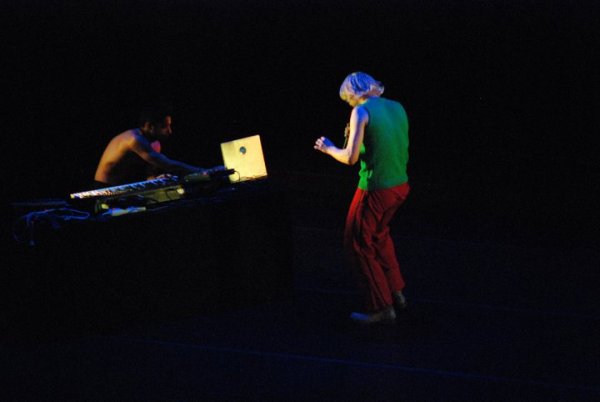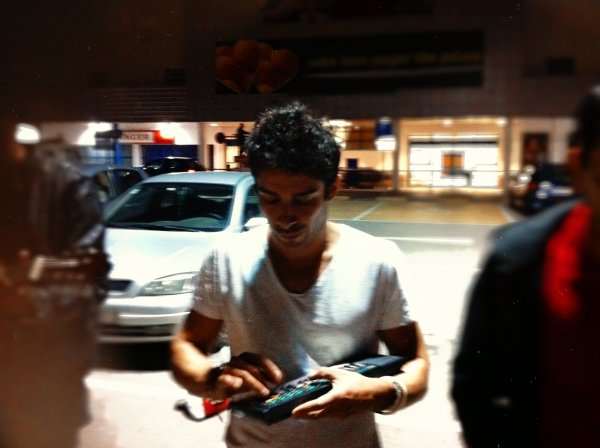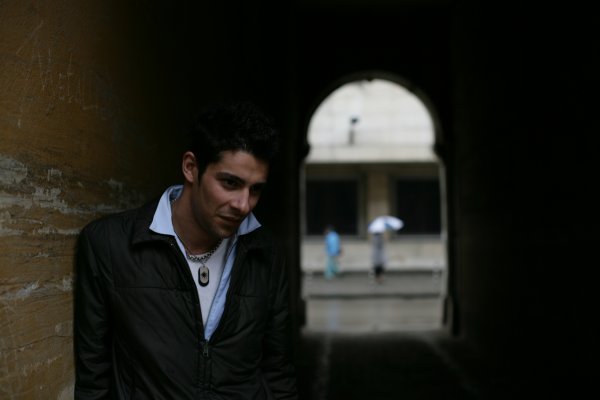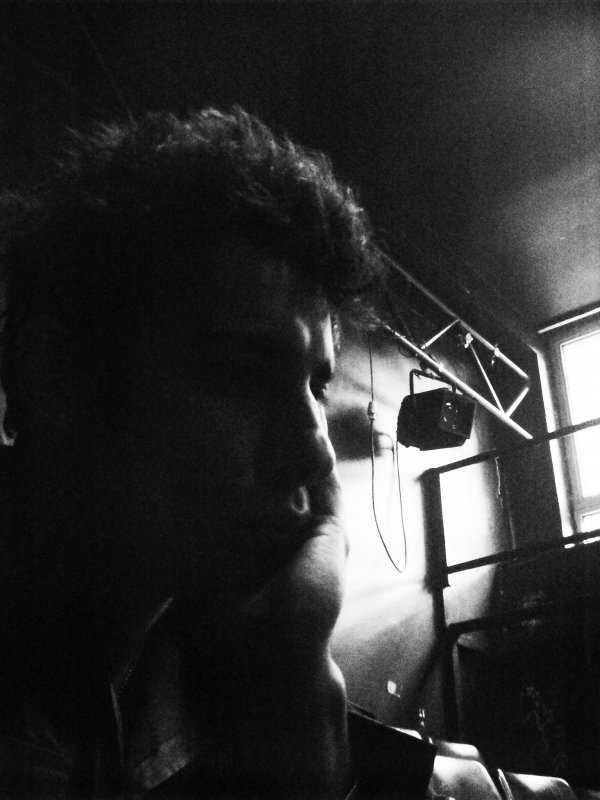Emilian Gatsov studied philosophy, multimedia and communications in Sofia. He composes music soundtracks for theatre and dance performances in Bulgaria and at international level, from theatre to abstract dance form, short movies, radioplays and commercials. He's been a nominee for major Bulgarian theatre music awards He composes music and plays live in contemporary dance works with members of NOMAD Dance Academy, Brain Store Project, Ballet Arabesque, OIsNotAcCompany. Along with Ivo Dimchev he has performed series of improvised concerts throughout Europe mostly within the context of dance festivals. His music is strongly visual, generating an atmosphere that brings the listener into the situation of a personal experience of what is heard and felt through music.
Gina Şerbănescu: How did you start to compose? Was it a specific impulse that led you to this?
Emilian Gatsov: Not much to say. I needed to create worlds... then to tell stories. Then to try to make people comfortable with what they are. I did a lot of ambient stuff in the beginning and it worked for theatre. In fact I've been always very dependent on music, this way it's easy to go to soundtracks once you realize that music forms your everyday soundtrack anyway.
G.Ş.: You wrote a lot of music for theatre. How does this music get born? More precisely, how do you write it? Are you part of the staging process, does the atmosphere inspires you, or is it a different process?
E.G.: I think I've already been through all kinds of working processes. It is strongly dependent on the persons, of course. With some people that I have been working for many years now I don't even follow the plot, I just generate let\'s say 2 gigas of audio around a bunch of ideas, but not placed in specific moments. Generally I do some kind of brainstorming in advance, I choose the aesthetics, instruments I can play around with, bits and sequences of audio that I can combine later in pieces. So, in the end there is some kind of a toolkit, flexible enough to be adjusted in every moment. I always have some kind of a structure in mind, because of my visual thinking. Another simple answer would be that I'm another performer on stage, shaped like a sound.
G.Ş.: You improvise for Ivo Dimchev's Concerto and every performance is different each time. What is the relation between the physicality of the performer and the improvised music? Do they generate each other in any form? What is your performative function in Concerto?
E.G.: We actually did and rehearsed a full set some time ago... and then we abandoned it. I'm not sure Ivo's physicality and singing can be separated. As far as the mentioned relation is concerned, I'm not sure I can tell anything new about the nature of improvisation. Of course it's a feedback loop, and they both generate each other. My function is not to think. I usually have a complex setup with looping software, a keyboard, a drum machine, couple of effects and the music is changing all the time. If I start to think which is where, I just couldn't catch up. So, ideally, this should be a trance situation, more or less. Paradoxically, when you really stop thinking about the output, time slows down and lets you take the decisions in cold blood. We usually perform in the context of dance festivals. Once we had Concerto in a music festival and it was so different. Dance audience is eager to see movements or the lack of them on stage, they watch more carefully in search for the visual manifestation of energy. In a way, this is the right thing for me, too, as I usually make music for stage anyway. Every piece turns into a situation, hence everything works. If we stop, if we hesitate or obviously don't have a clear idea what to do, it works too. When we performed in Bucharest - Nottara Theatre, because of some electricity problems my laptop adapter was blown off and I had to play only with a few abstract sound patches on my synth. We tried to fix the problem in front of the audience, because there was another performance before ours and people just remained on their seats, watching us reconnecting cables. I was pissed off, but then I thought I didn't have to hide my embarrassment, we're in the spotlight anyway. We talked later that it's actually quite rare to see people on stage honest for their embarrassment and unease. It's a situation...
G.Ş.: Listening to almost all your music that I could find, it was clear to me that you suggest me a specific style, listening to it I can instantly visualize images, though the music stays abstract at the same time (I must specify that this does not happen to me whenever I listen to music). What is the relation between the physical perception of the images and the abstract reality of the sound?
E.G.: My thinking is visual. I'm generally much more interested in timbre and texture than abstract sequences of notes as in sheet music. If by abstract you mean, for instance, \'non-saxophone' then that is what I'm talking about. My first serious interest in music was related to the ability to create sounds never heard before and I still spend big time making my own sounds. And if it's a saxophone after all, let it come with the breath of the player and the reflection of drums in the back. It's the reality effect as Roland Barthes calls it, adding non-significant details to the main picture... Every piece of sound is an object. Or I guess it's the mixing method. You can choose to mix all the layers in a piece into a smooth stream of sound or you can choose to make every little bit of crap distinct. I guess I do the latter... .
G.Ş.: Is there any function of the clichés in composing music? How much is originality and how much is influence in creating music?
E.G.: I believe there are clichés in the way our brain reacts at certain succession or coincidence of events; our way of calling the low frequencies 'low" and the high frequencies 'high' is the most basic example. The close similarity of any solo instrument in an orchestra to the human voice is another; they always cut in the mix for us. The sense of anxiety or sadness coming with minor/disharmonic scales is another. Our hearing is a machine shaped by evolution for certain needs, our biology is a cliché. Speaking of the impact that music has on emotions at basic level, some clichés are probably inevitable. But I guess you're asking about quotations. I am not good at literal quotations but I often happen to study the form of a certain piece or style and then try to mimic it. It is hard to answer honestly. We are surrounded by music all day long, our head is a constant youtube-ipod-podcast shuffle. The only originality I can think of is placing a piece in a surprisingly right context.
G.Ş.: You give workshops. What is your methodology in conveying your music approach?
E.G.: I'm more likely digging into specific stuff that I am interested in and into what I also don't completely understand, so I'm curious how other people feel about it, or if they feel it at all on perceptional and emotional level. Specifically, the Emotional Snapshots workshop that I gave is about something that I'm often applying to my own music before any conceptualization. Hard to explain it in a few words, but - it's about how it is possible to extract only the emotionally significant bits of a recording. How to compress the feeling in a ten second snapshot (or a loop), like the climax without the development. Or like the 'hook' in pop songs, the phrase that sticks to your brain. Hard to plan it rationally, your ears know better by all means. So what you have to do is keep them open and then watch your emotions. I'm interested in those moments when music hits your emotion directly with a sledgehammer, without a notice or reasonable explanation. So the workshop is about researching this. Not quite musically, more psychologically. The rest is technically quite simple.
G.Ş.: The sequence of sounds is somehow similar to the elapse of time. Do you feel any connection between temporality and music? What about the space? Can there be any spatial perception of music?
E.G.: It is obvious that music is related to time. In the workshop that I already mentioned, one of the basic idea was... .the killing of time. When you have a loop, when everything is going on and on in circles, everything that's into it, that goes into it is more clearly heard because you have it over and over, so in the end you have this clear sense of position, because all the elements are contained in a loop and the perception gets supervisual, you have no sense of time anymore, because of the repetition, you do not measure time any longer like when you have a story, a narrative, that time span that you can perceive/measure when there is a story told. When there is this repeating, this loop, the sense of time fades away and time turns into a visual entity. And this is also the answer to the question related to the space. I try to do a lot of loops like this, sometimes I don't know what to do with them, I usually use them as basis for pieces, of course, but I use them especially as a tool for a visual way of thinking music.
G.Ş.: Listening to some of your pieces I had a very spatial perception of music, like I was trapped in a space and could hear sounds from outside that trap, and viceversa... And I had this feeling that your music is building dwellings that contain the listener...
E.G.: Yes, this is also related to the technical stuff... Technically, when I play with rhythm, when I put different effects to different sounds, there can be easily built the illusion of space, because the brain actually measures these reflections. In this rooms, when we speak, we have these reflections on the walls, the brain really measures them and constructs the idea of space, this is how we measure distance, for instance, or how big the space is and this is a function that we have for surviving, after all...
G.Ş.: Do you dream music?
E.G.: I used to... Usually I dream songs that I hear over the day, not my pieces... You dream a melody, than you play it on an instrument, different from the one in your dream and it doesn't sound like in the dream at all... .What I am mostly interested in is the texture, and making it sound like you want is sometimes a question of chance... So, when I do music, I prefer to listen first, that is why I work with a lot of samples and see what can I take out of this material...
G.Ş.: But isn't it somehow like writing poetry, in a way? If one has a reservoir of words and images, one can mix them into a poem...
E.G.: Yes, because I think that the material that I have is about images, but still with no exact reference... The methodology of building the sequence is the same like in poetry... For two years I have been interested in perfumes, there is a big talk nowadays around this topic, there are reviews, blogs and forums about this... Smell hits the brain like no other sense, going directly into the limbic system, instantly transmitting emotion and activating memories. It is hard and not very useful to explain it as explanation comes always post factum. They do a lot of 'technical' analysis there, breaking smells into notes, analizing structures in a visual, non-linear way. I became interested because my work often consists of samples, combined 'snapshots' out of different realities, bits of sound like memories without actual memory... And always a lot of ambiguity with words, yet very powerful at a subconscious level. This is how I feel music should be. This is what I would love to happen with music, make it escape that process of brain distribution and send it right to centre where one gets the instant feeling...
You can listen to Emilian Gatsov's music here:
http://www.secondbody.net/
http://soundcloud.com/secondbody
I'm just another performer on stage, shaped like a sound
Gina Șerbănescu, un interviu cu Emilian Gatsov
0 comentarii
Arhiva rubricii
Nici măcar nu îi mai conduci, ci le dictezi propria declarație a acelui moment!, Marius Constantinescu, un interviu cu Vadim RepinÎncerc să mențin mereu vie comunicarea, Marius Constantinescu, un interviu cu Hilary HahnCoabitarea în realitatea tehnologică - Speranța nu urcă niciodată cu liftul, Răzvan Rocaș, un interviu cu Toni NicaCa interpret de operă ai provocarea uriașă de a încerca să supraviețuiești în fiecare zi, Marius Constantinescu, un interviu cu Max Emanuel CencicHeartefact. Politică. Teatru. Fabulamundi. Playwriting Europe. New Voices., Anda Cadariu, un interviu cu Patrik LazićToate articolele din această rubricăRubricile categoriei
InterviuriLa persoana Ificti.on.allBibliopolisO săptămînă de prieteniAutismul, din interiorPrimul an de publicitateÎnsemnări mediavitaleJurnal de actor / actriţă în izolarePublicitate




